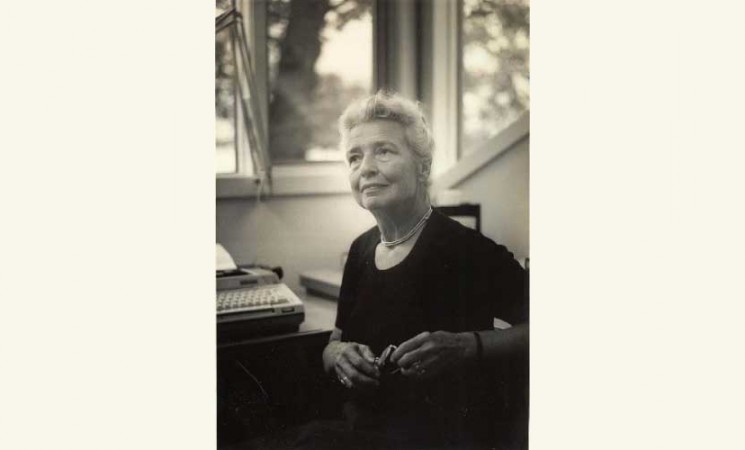Archived Content
This page is archived and provided for historical reference. The content is no longer being updated, and some of the information may have changed over time and could be outdated or inaccurate.

By William Elwood, Ph.D.
Matilda White Riley, Ph.D. (1911–2004), was an academic and human force of nature whose legacy endures in the fields of communication, human development, interpersonal and intergenerational relationships, gerontology, and sociology. Current researchers still cite her work.
The children she raised, the grandchildren she cherished, and the generations of scholars she mentored at Rutgers University and, later, Bowdoin College are also a living testament to her trailblazing life and career.
Between her professorships at Rutgers and Bowdoin (and the ages of 68 and 88), Dr. White Riley forever influenced the conception of health and well-being at the NIH by more thoroughly integrating social and behavioral perspectives throughout the agency’s biomedical research enterprise.
The NIH Office of Behavioral and Social Sciences Research (OBSSR) continues this trajectory for NIH and shares Dr. White Riley’s and the agency’s commitment to foster new generations of researchers. That’s why, this year, OBSSR launched the Matilda White Riley Early Stage Investigator Honors: To acknowledge excellence in young investigators and disseminate their findings to a broader audience than peer-reviewed articles usually reach.
ESI #callforarticles response, like MWR’s life, career, & legacy: Overwhelming, humbling, inspirational #MWRDay2016
The response to our initial call for articles from ESIs was akin to our experience of Matilda’s life, career, and legacy: Overwhelming, humbling, and inspirational. OBSSR convened a panel of NIH experts with related expertise to rank these submissions according to criteria that correspond to Dr. White Riley’s legacy:
- Behavioral and social sciences research results that improve the lives of people and society
- Work that illuminates the complex and dynamic interplay among processes at multiple levels (e.g., interactions between genes and the built, natural, and social environment)
- Influence of social and behavioral factors on physical health and the utility of this knowledge for clinical practice and/or health policy
- Life course perspectives on development, health, and well-being of individuals and societies
- Research approaches that build theory and methods to advance knowledge on health and well-being
Though the criteria seem daunting, our expert panel found 50 of the many submitted articles substantively met these criteria. Therefore, OBSSR considers all these authors to be NIH/OBSSR’s Matilda White Riley ESI Honorees for 2016.
While the number may seem large, we should consider the myriad of disciplines that constitute the social and behavioral sciences. Moreover, every human behavior and social interaction with others influences our health, recovery (when needed), and well-being. The work these honorees published reflects excellence in their authors’ respective fields and contributes collectively to NIH’s mission to turn discovery into health.
We will feature these honorees’ guest blog posts in The OBSSR Connector from June through December—a practice we anticipate making an OBSSR tradition. The findings, methods, and perspectives in the original publications provided the expert panelists and me with a unique opportunity to reassess our own research perspectives. I hope you will have similar experiences as you read our honorees’ posts and, when so motivated, their original peer-reviewed publications.
Regarding perspectives, it seems appropriate to close this post by referring to one of OBSSR’s favorite portraits of Matilda White Riley. Though it appears to be a professional portrait, it depicts a pleasantly penchant Matilda in her sunny top-floor home office, which she affectionately called her “Crow’s Nest.” She seems to have turned away from the work at her desk, removed her reading glasses temporarily, and been instructed by the photographer to smile, even though she clearly was in thought.
Though Matilda physically can’t inhabit her beloved Crow’s Nest or read these posts and articles, we believe your faces will have similarly thoughtful expressions when you read the work of our 2016 honorees. (Ours certainly did!) We also welcome opportunities to connect you to our honorees or to facilitate your commentary on their work.








